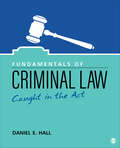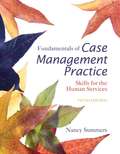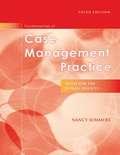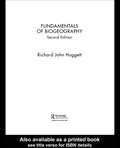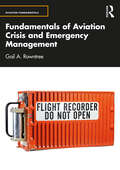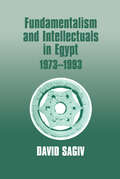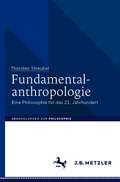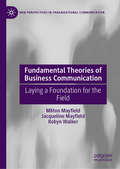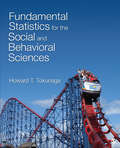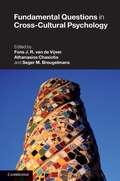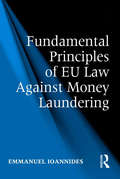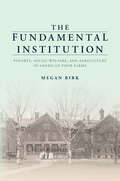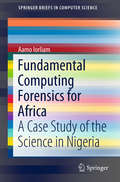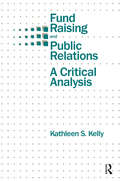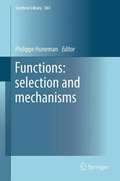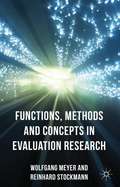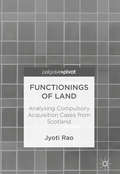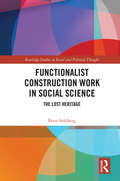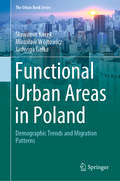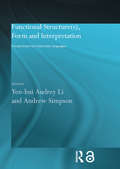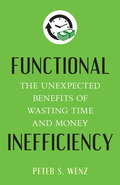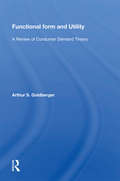- Table View
- List View
Fundamentals of Criminal Law: Caught in the Act
by Daniel E. HallFundamentals of Criminal Law: Caught in the Act offers an accessible, comprehensive and contemporary survey of the field. With a focus on the current state of the law and on contemporary problems that matter to students, all presented in way that piques curiosity and interest, this book will cover topics such as hate crime, free speech, human trafficking, firearms possession and use, self-defense, cybercrime, and Internet stalking. Author Daniel E. Hall has written engaging content to help students think critically about how criminal acts are defined, defended, and determined. Built around a conversational narrative, the concepts and optional case studies connect to real life. There is also a clear emphasis on cases and examples that are relevant to criminal justice majors and future practitioners, such as litigation against police and correctional officers, terrorism, the death penalty, corporal punishment in prisons, etc. Try these free Criminal Law activities in your class This title is accompanied by a complete teaching and learning package. Contact your SAGE representative to request a demo. Digital Option / Courseware SAGE Vantage is an intuitive digital platform that delivers this text’s content and course materials in a learning experience that offers auto-graded assignments and interactive multimedia tools, all carefully designed to ignite student engagement and drive critical thinking. Built with you and your students in mind, it offers simple course set-up and enables students to better prepare for class. Learn more. LMS Cartridge (formerly known as SAGE Coursepacks): Import this title’s instructor resources into your school’s learning management system (LMS) and save time. Don’t use an LMS? You can still access all of the same online resources for this title via the password-protected Instructor Resource Site. Learn more.
Fundamentals of Criminal Law: Caught in the Act
by Daniel E. HallFundamentals of Criminal Law: Caught in the Act offers an accessible, comprehensive and contemporary survey of the field. With a focus on the current state of the law and on contemporary problems that matter to students, all presented in way that piques curiosity and interest, this book will cover topics such as hate crime, free speech, human trafficking, firearms possession and use, self-defense, cybercrime, and Internet stalking. Author Daniel E. Hall has written engaging content to help students think critically about how criminal acts are defined, defended, and determined. Built around a conversational narrative, the concepts and optional case studies connect to real life. There is also a clear emphasis on cases and examples that are relevant to criminal justice majors and future practitioners, such as litigation against police and correctional officers, terrorism, the death penalty, corporal punishment in prisons, etc. Try these free Criminal Law activities in your class This title is accompanied by a complete teaching and learning package. Contact your SAGE representative to request a demo. Digital Option / Courseware SAGE Vantage is an intuitive digital platform that delivers this text’s content and course materials in a learning experience that offers auto-graded assignments and interactive multimedia tools, all carefully designed to ignite student engagement and drive critical thinking. Built with you and your students in mind, it offers simple course set-up and enables students to better prepare for class. Learn more. LMS Cartridge (formerly known as SAGE Coursepacks): Import this title’s instructor resources into your school’s learning management system (LMS) and save time. Don’t use an LMS? You can still access all of the same online resources for this title via the password-protected Instructor Resource Site. Learn more.
Fundamentals of Case Management Practice: Skills for the Human Services
by Nancy SummersThis book/workbook is a step-by-step guide through the case management process, from intake and assessment to referrals and termination. The fifth edition focuses on what is most important for readers to consider, document, and pass along in each step of the human services process. Chapters walk readers through each step of the case management process, while realistic exercises drawn from active professionals expose readers to a broad range of true-to-life circumstances and difficulties.
Fundamentals of Case Management Practice: Skills for the Human Services (3rd Edition)
by Nancy SummersSummers (Harrisburg Area Community College) walks through the case management process, and offers advice on meeting clients, recording initial inquiries, using the DSM IV, developing a service plan, monitoring service or treatment, and effectively documenting the process. The workbook format provides exercises for developing practical skills, and sample social service forms on perforated pages. The second edition adds a chapter on social histories and assessment forms.
Fundamentals of Biogeography (Routledge Fundamentals of Physical Geography)
by Richard John HuggettFundamentals of Biogeography presents an accessible, engaging and comprehensive introduction to biogeography, explaining the ecology, geography, history and conservation of animals and plants. Starting with an outline of how species arise, disperse, diversify and become extinct, the book examines: how environmental factors (climate, substrate, topography, and disturbance) influence animals and plants; investigates how populations grow, interact and survive; how communities form and change; and explores the connections between biogeography and conservation.The second edition has been extensively revised and expanded throughout to cover new topics and revisit themes from the first edition in more depth. Illustrated throughout with informative diagrams and attractive photos and including guides to further reading, chapter summaries and an extensive glossary of key terms, Fundamentals of Biogeography clearly explains key concepts in the history, geography and ecology of life systems. In doing so, it tackles some of the most topical and controversial environmental and ethical concerns including species over-exploitation, the impacts of global warming, habitat fragmentation, biodiversity loss and ecosystem restoration.
Fundamentals of Aviation Crisis and Emergency Management (ISSN)
by Gail A. RowntreeThis book takes the topic of aviation crisis and emergency management and walks the reader through what aviation organisations must consider alongside legislation to respond fully to an aviation emergency or accident. It offers both theory and practical tips and ideas along with templates and checklists to help build confidence in how to run an aviation emergency operation. This includes timelines for activation, setting up and managing humanitarian centres and how a full aviation crisis operation runs at the site of the accident.Fundamentals of Aviation Crisis and Emergency Management is the only textbook available with all required elements laid out chronologically. The reader can plan for, train for, and exercise for a multitude of crisis examples, building both confidence and competence in managing an aviation emergency. Fundamentals of Aviation Crisis and Emergency Management includes a range of case studies and a variety of interviews with those people who have experienced an aviation crisis and deployed to it. This allows the reader to fully immerse themselves in the topic and makes the book both a textbook of key knowledge and also a book that can be read for increasing understanding of the topic. It will be essential for aviation students and professionals, disaster response organisations, and emergency planners.
Fundamentalism and Intellectuals in Egypt, 1973-1993
by David SagivThis study examines the attitude of Egyptian intellectuals towards Islamic fundamentalism in Egypt. They believe that to establish an Islamic state would mean a return to the Middle Ages and that Western values do not necessarily contradict Islam. How far can they influence Egypt's future?
Fundamentalanthropologie: Eine Philosophie für das 21. Jahrhundert (Abhandlungen zur Philosophie)
by Thorsten StreubelDie Frage nach dem Menschen ist heute – im Zeitalter der zunehmenden Verschmelzung von Mensch und Technik (Cyborgisierung), der Genom-Editierung und der fortgeschrittenen Naturalisierung des Menschenbildes – aktueller denn je. Der Autor präsentiert hier erstmals eine systematische und prägnante Darstellung der Idee einer neuen Anthropologie, welche die mundanen, transzendentalen und transphänomenalen Aspekte des Menschseins gleichermaßen berücksichtigt und die Reduktion des Menschen auf seinen biologischen Körper zurückweist. Diese ‚Fundamentalanthropologie‘ genannte Disziplin versteht sich als philosophische Grundlagendisziplin und als Herzstück der Philosophie als allgemeiner Anthropologie. Außerdem werden in diesem Band zentrale und aktuelle philosophische Themen wie Selbstbewusstsein, Identität des Ich, das Wesen des menschlichen Geistes sowie die Zukunft des Menschen erstmals zum Gegenstand fundamentalanthropologischer Analysen gemacht.
Fundamental Theories of Business Communication: Laying a Foundation for the Field (New Perspectives in Organizational Communication)
by Robyn Walker Milton Mayfield Jacqueline MayfieldThis book examines the major business communication theories, delving into their relationships and practical applications. Many business communication studies lack a strong theoretical grounding—a deficit that creates difficulties for researching business communication phenomena and building upon previous studies. The book addresses this issue by cataloging and briefly describing the major business communication theories, as well as giving a typology of these theories to better integrate them. This book provides value to business communication researchers (who can use it to build upon and develop their work), experts in practice (who can apply it to improve business communications), and academics (who can use it to enhance their instructional designs). It also offers insights into new developments on the business communication theory horizon.
Fundamental Statistics for the Social and Behavioral Sciences: Tokunaga: Fundamental Statistics For The Social And Behavioral Sciences + Sage Ibm® Spss® Statistics V23. 0 Student Version
by Howard T. TokunagaThis thematically-based textbook places statistics within the research process, illustrating how statistics are used to answer questions and test ideas. Students learn not only how to calculate statistics, but also how to interpret the results of statistical analyses in light of a study’s research hypothesis and to communicate their results and interpretations to a broader audience. Featuring accessible writing and well-integrated research examples, Fundamental Statistics for the Social and Behavioral Sciences by Howard T. Tokunaga is designed to help readers develop an appreciation of how statistics are applied to topics and questions of interest, gain an appreciation of issues related to the use of statistics, and enhance their understanding of the research process and the role of statistics within it.
Fundamental Statistics for the Social and Behavioral Sciences: Tokunaga: Fundamental Statistics For The Social And Behavioral Sciences + Sage Ibm® Spss® Statistics V23. 0 Student Version
by Howard T. TokunagaThis thematically-based textbook places statistics within the research process, illustrating how statistics are used to answer questions and test ideas. Students learn not only how to calculate statistics, but also how to interpret the results of statistical analyses in light of a study’s research hypothesis and to communicate their results and interpretations to a broader audience. Featuring accessible writing and well-integrated research examples, Fundamental Statistics for the Social and Behavioral Sciences by Howard T. Tokunaga is designed to help readers develop an appreciation of how statistics are applied to topics and questions of interest, gain an appreciation of issues related to the use of statistics, and enhance their understanding of the research process and the role of statistics within it.
Fundamental Questions in Cross-Cultural Psychology
by Seger M. Breugelmans Fons J. van de Vijver Athanasios ChasiotisCross-cultural psychology has come of age as a scientific discipline, but how has it developed? The field has moved from exploratory studies, in which researchers were mainly interested in finding differences in psychological functioning without any clear expectation, to detailed hypothesis tests of theories of cross-cultural differences. This book takes stock of the large number of empirical studies conducted over the last decades to evaluate the current state of the field. Specialists from various domains provide an overview of their area, linking it to the fundamental questions of cross-cultural psychology such as how individuals and their cultures are linked, how the link evolves during development, and what the methodological challenges of the field are. This book will appeal to academic researchers and post-graduates interested in cross-cultural research.
Fundamental Principles of EU Law Against Money Laundering
by Emmanuel IoannidesThis book critically analyses fundamental principles of EU law for the control of international economic crime. Discussing how the reporting system and the exchange of information are at the heart of the global anti-money laundering regime, the study also looks at the inferential force of financial intelligence in criminal proceedings and the responsibilities this places on prosecutors and criminals alike. The author closely examines the application of Article 8(2) of the European Court of Human Rights for the retention and movement of the fingerprints, cellular samples and DNA profiles of unconvicted persons, and argues the incompatibility with the ECHR, along with the effect of socially stigmatising unconvicted persons. The work concludes with exploring how financial regulation has, inter alia, shifted responsibility to businesses and financial institutions to become more transparent and accountable to financial regulators and tax authorities. This critical analysis is essential reading for law students and the Judicial Body, as well as financial crime investigators and regulators.
The Fundamental Institution: Poverty, Social Welfare, and Agriculture in American Poor Farms
by Megan BirkBy the early 1900s, the poor farm had become a ubiquitous part of America's social welfare system. Megan Birk's history of this foundational but forgotten institution focuses on the connection between agriculture, provisions for the disadvantaged, and the daily realities of life at poor farms. Conceived as an inexpensive way to provide care for the indigent, poor farms in fact attracted wards that ranged from abused wives and the elderly to orphans, the disabled, and disaster victims. Most people arrived unable rather than unwilling to work, some because of physical problems, others due to a lack of skills or because a changing labor market had left them behind. Birk blends the personal stories of participants with institutional histories to reveal a loose-knit system that provided a measure of care to everyone without an overarching philosophy of reform or rehabilitation. In-depth and innovative, The Fundamental Institution offers an overdue portrait of rural social welfare in the United States.
Fundamental Computing Forensics for Africa: A Case Study of the Science in Nigeria (SpringerBriefs in Computer Science)
by Aamo IorliamThis book presents a general introduction to the computational aspects of forensic science, covering the different tools needed for forensic investigations, the importance of forensics and biometrics, and the use of Benford’s law for biometrics and network traffic analysis. It specifically focuses on the application of these techniques in Africa, and how they can be of benefit in the investigation of crime in Nigeria in particular.
Fund Raising and Public Relations: A Critical Analysis (Routledge Communication Ser.)
by Kathleen S. KellyThis is the first scholarly work to place the function of fund raising within the field of public relations, redefining it as a specialization responsible for the management of communication between a charitable organization and its donor publics. Combining her academic interest in communication with her experience as a fund raiser, the author has produced one of the few critical studies on fund raising, challenging current perspectives and employing systems theory and the concept of organizational autonomy to lead to a new and different approach. Until now, fund raising has been an anomaly, without an academic home and with few general theories to guide practitioner behavior. This book theoretically grounds fund raising and develops a theory that provides a fuller understanding of one of the fastest growing occupations in the nonprofit sector.
Functions: selection and mechanisms (Synthese Library #363)
by Philippe HunemanThis volume handles in various perspectives the concept of function and the nature of functional explanations, topics much discussed since two major and conflicting accounts have been raised by Larry Wright and Robert Cummins’ papers in the 1970s. Here, both Wright’s ‘etiological theory of functions’ and Cummins’ ‘systemic’ conception of functions are refined and elaborated in the light of current scientific practice, with papers showing how the ‘etiological’ theory faces several objections and may in reply be revisited, while its counterpart became ever more sophisticated, as researchers discovered fresh applications for it. Relying on a firm knowledge of the original positions and debates, this volume presents cutting-edge research evincing the complexities that today pertain in function theory in various sciences. Alongside original papers from authors central to the controversy, work by emerging researchers taking novel perspectives will add to the potential avenues to be followed in the future. Not only does the book adopt no a priori assumptions about the scope of functional explanations, it also incorporates material from several very different scientific domains, e.g. neurosciences, ecology, or technology. In general, functions are implemented in mechanisms; and functional explanations in biology have often an essential relation with natural selection. These two basic claims set the stage for this book’s coverage of investigations concerning both ‘functional’ explanations, and the ‘metaphysics’ of functions. It casts new light on these claims, by testing them through their confrontation with scientific developments in biology, psychology, and recent developments concerning the metaphysics of realization. Rather than debating a single theory of functions, this book presents the richness of philosophical issues raised by functional discourse throughout the various sciences.
Functions, Methods And Concepts In Evaluation Research
by Reinhard Stockmann Wolfgang Meyer Gareth BartleyBy explaining the role of evaluation in modern societies and its historical development in the USA and Europe this book highlights the scientific roots of Evaluation and offers an overview of its fundamental theories and concepts. The process of collecting, analyzing and interpreting is explored giving an insight into the course of an evaluation.
Functions: selection and mechanisms
by Philippe HunemanThis volume handles in various perspectives the concept of function and the nature of functional explanations, topics much discussed since two major and conflicting accounts have been raised by Larry Wright and Robert Cummins' papers in the 1970s. Here, both Wright's 'etiological theory of functions' and Cummins' 'systemic' conception of functions are refined and elaborated in the light of current scientific practice, with papers showing how the 'etiological' theory faces several objections and may in reply be revisited, while its counterpart became ever more sophisticated, as researchers discovered fresh applications for it. Relying on a firm knowledge of the original positions and debates, this volume presents cutting-edge research evincing the complexities that today pertain in function theory in various sciences. Alongside original papers from authors central to the controversy, work by emerging researchers taking novel perspectives will add to the potential avenues to be followed in the future. Not only does the book adopt no a priori assumptions about the scope of functional explanations, it also incorporates material from several very different scientific domains, e.g. neurosciences, ecology, or technology. In general, functions are implemented in mechanisms; and functional explanations in biology have often an essential relation with natural selection. These two basic claims set the stage for this book's coverage of investigations concerning both 'functional' explanations, and the 'metaphysics' of functions. It casts new light on these claims, by testing them through their confrontation with scientific developments in biology, psychology, and recent developments concerning the metaphysics of realization. Rather than debating a single theory of functions, this book presents the richness of philosophical issues raised by functional discourse throughout the various sciences.
Functionings of Land: Analysing Compulsory Acquisition Cases from Scotland
by Jyoti RaoThis book focuses on the 'functionings' and capabilities generated from land by their owners and the challenge in satisfactorily recreating these through the compensation paid in the case of compulsory acquisition of private land. These discussions initiate a new debate on the insufficiency of existing approaches to compensation that are ignorant of the losses of ‘capabilities’ and ‘functionings’. The relationship between land, ownership and well-being of an individual is explained through the identification of various ‘functionings’ associated with the ownership of land in the context of Scotland. Contemporary approaches to compensation, founded on the utilitarian argument, have led to dissatisfactory outcomes for the affected landowners. Discussions in this book shift the focus to equalizing the share of burdens and benefits for each individual member of the society, through equalization of human capabilities. This book will be of value to development economists, researchers, policy makers and law makers concerned with compulsory acquisition of land.
Functionalist Construction Work in Social Science: The Lost Heritage (Routledge Studies in Social and Political Thought)
by Peter SohlbergAn understanding of the complex consequences of social processes and social design activities necessitates a holistic systemic perspective, systematised in the classic structural-functional research tradition, which is presented in Functionalist Construction Work in Social Science. In contrast to fragmented discussions of functionalism and functional analyses, the approach here covers a span ranging from ontological, epistemological and primarily methodological aspects of functionalism. The functionalist tradition in social science is placed in a historic context, and problematised from a philosophy of science perspective. Unique here is a detailed account of four classic functionalist research programmes with a discussion of functionalism, not primarily as a worldview, but as systematic knowledge-generating research strategies. In addition to descriptive and causal questions, the importance of a further research question is demonstrated, i.e., the identification of crucial problems of social organisation. Functionalist research strategies and functional analysis are of interest for social scientists and students in sociology, political science, and social anthropology. Moreover, the book is relevant for researchers and students of philosophy of science and social science methodology
Functional Urban Areas in Poland: Demographic Trends and Migration Patterns (The Urban Book Series)
by Sławomir Kurek Mirosław Wójtowicz Jadwiga GałkaThis book explores demographic changes in Functional Urban Areas (FUAs) in Poland since 1990. Functional Urban Areas, introduced by ESPON, refer to functional territorial units that can be defined as travel-to-work-area, representing strong integration between urban cores and their immediate hinterland. The functional urban area consists of a city plus its commuting zone. It fills a significant gap in the academic literature by providing a deep and thorough analysis of the process of population change in Polish FUAs over the past 30 years. In particular, this empirical research work addresses population growth and decline; the main components of population growth including fertility, mortality and migration; age composition; and the pace of population ageing. The book argues that the transformations of urban structures are triggered by second demographic transition (SDT) and suburbanization processes. Based on data from the Central Statistical Office, this comparative study on FUAs in Poland, which employs a division into core and commuting zones, reveals essential similarities and differences in population development, making it possible to construct a demographic typology of FUAs and investigate their spatial arrangements. A unique and innovative book, it will appeal to geographers, demographers, urbanists, city planners and policymakers, as well as students, academic researchers and others involved in urban studies.
Functional Structure: Perspectives from East Asian Languages (Routledge Studies in Asian Linguistics)
by Yen-hui Audrey Li Andrew SimpsonThe issue of how interpretation results from the form and type of syntactic structures present in language is one which is central and hotly debated in both theoretical and descriptive linguistics.This volume brings together a series of eleven new cutting-edge essays by leading experts in East Asian languages which shows how the study of formal structures and functional morphemes in Chinese, Japanese and Korean adds much to our general understanding of the close connections between form and interpretation. This specially commissioned collection will be of interest to linguists of all backgrounds working in the general area of syntax and language change, as well as those with a special interest in Chinese, Japanese and Korean.
Functional Inefficiency
by Peter S. WenzHow can we reduce unemployment? As this insightful and counterintuitive book shows, the surprising answer is inefficiency. Some of the most labor-intensive sectors of the economy, the author notes, are also the most inefficient. But this inefficiency is functional--rather than impairing the economy, it bolsters employment and fosters economic growth.Technological progress increases efficiency and reduces the need for workers in manufacturing, mining, agriculture, and many services. So how do we keep people working? By maintaining inefficiencies in other areas, such as in our systems of transportation and healthcare. The author documents the waste of time and money in hospital systems, the insurance and pharmaceutical industries, automotive travel, and road construction and maintenance. These inefficiencies are tolerated because they provide a lot of jobs and promote economic growth, making them functional inefficiencies.Some of these inefficient systems come with added environmental and health costs, meaning we sacrifice more than simple efficiency for the sake of jobs. Our inefficiencies may be functional, argues Peter Wenz, but they are too often harmful for us as well.The good news is that most of these inefficiencies can be reduced without increasing unemployment or impairing economic growth. Wenz explores different methods of combating unemployment, evaluating each method carefully to determine its basic efficiencies and inefficiencies, as well as its impact on human wellbeing and on the environment. He also assesses whether it is culturally and politically acceptable and actually serves to reduce unemployment. Some inefficiency will remain, he concludes, but its negative impacts can be lessened through increased investment in physical and human infrastructure.Functional Inefficiency offers a wealth of details and a unique analysis of our economic system, plus hope for our future prospects through reduced inefficiency.From the Hardcover edition.
Functional Form And Utility: A Review Of Consumer Demand Theory
by Arthur GoldbergerThis book presents a review of classical consumer demand theory, emphasizing the form of utility and demand functions. The theory is developed in general terms with reference to the linear expenditure system and with reference to alternative specifications of complete sets of demand functions.
